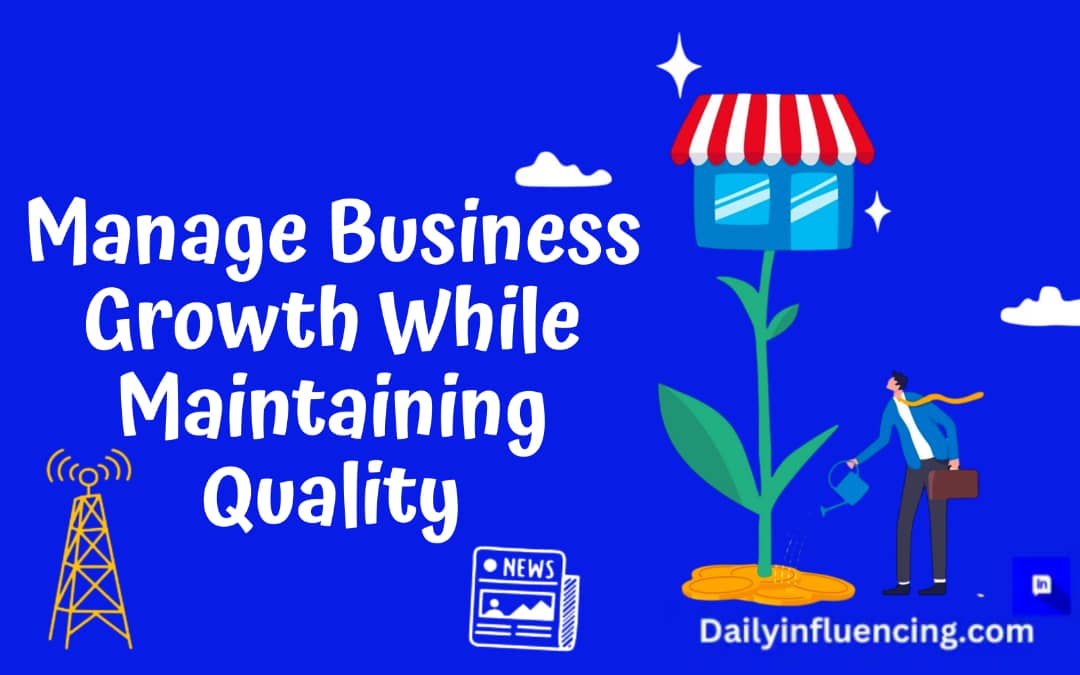
Growth is an exciting phase for any business. It means more customers, more opportunities, and more success. However, with growth comes challenges, especially when it comes to maintaining the quality of your products or services. If you don’t manage business growth properly, you risk losing the trust of your customers and damaging your reputation.
In this article, we’ll see practical strategies to help you manage business growth effectively while keeping quality at the forefront. Whether you’re a small business owner or leading a larger team, these tips will help you navigate the complexities of scaling up without compromising on what made your business successful in the first place.
Why It Is Necessary To Manage Business Growth

When a business starts to grow, it’s easy to get caught up in the excitement. You might see more sales, more clients, or even more recognition in your industry. But if you don’t manage business growth carefully, things can quickly spiral out of control. For example, you might struggle to meet customer demands, or your team might feel overwhelmed by the increased workload. Worse still, the quality of your products or services might start to decline, leading to unhappy customers and negative reviews.
The key to successful growth is balance. You need to find ways to scale your operations while maintaining the standards that your customers expect. This isn’t always easy, but with the right strategies, it’s entirely possible. Let’s dive into some actionable steps you can take to manage business growth without sacrificing quality.
How To Manage Business Growth

1. Plan Ahead For Growth
One of the biggest mistakes businesses make is failing to plan for growth. It’s not enough to simply hope that your business will grow—you need to have a clear plan in place. Start by setting realistic goals for your business. Ask yourself: Where do I want my business to be in six months? A year? Five years? Once you have a vision, you can create a roadmap to get there.
If for example you’re expecting an increase in orders, make sure you have the resources to handle them. This might mean hiring more staff, investing in new equipment, or finding a larger workspace. By planning ahead, you can avoid the stress and chaos that often comes with sudden growth.
2. Focus On Your Core Values
As your business grows, it’s important to stay true to your core values. These are the principles that define your business and set you apart from the competition. Whether it’s exceptional customer service, high-quality products, or a commitment to sustainability, your core values should guide every decision you make.
When you manage business growth, it’s easy to lose sight of these values. You might be tempted to cut corners to save time or money, but this can have serious consequences. For example, if you start using cheaper materials to meet demand, the quality of your products might suffer, and your customers will notice. Instead, focus on finding ways to scale your operations without compromising on what makes your business unique.
3. Invest In Your Team

Your team is one of your most valuable assets, especially during periods of growth. As your business expands, you’ll need to rely on your employees more than ever. That’s why it’s important to invest in their development and well-being.
Start by providing training and resources to help your team adapt to new challenges. For example, if you’re introducing new technology, make sure your employees know how to use it effectively. You should also consider hiring additional staff to ease the workload on your existing team.
Another way to support your team is by fostering a positive work environment. When employees feel valued and supported, they’re more likely to stay motivated and deliver high-quality work. This, in turn, helps you maintain the standards your customers expect.
4. Streamline Your Processes
As your business grows, your processes will need to evolve. What worked for a small team might not be efficient for a larger one. That’s why it’s important to regularly review and streamline your operations.
Look for areas where you can save time and reduce waste. For example, you might automate repetitive tasks, such as invoicing or inventory management. You could also implement project management tools to keep your team organized and on track.
By streamlining your processes, you can improve efficiency and reduce the risk of errors. This not only helps you manage business growth more effectively but also ensures that your customers continue to receive the same high-quality experience they’ve come to expect.
5. Listen To Your Customers
Your customers are the lifeblood of your business, so it’s important to listen to their feedback. As your business grows, their needs and expectations might change. By staying in tune with their preferences, you can make informed decisions that support both growth and quality.
There are several ways to gather customer feedback. You might send out surveys, monitor online reviews, or engage with customers on social media. Pay attention to recurring themes or concerns, and use this information to improve your products or services.
Let’s say, if customers are complaining about long wait times, you might need to hire more staff or improve your order processing system. By addressing these issues proactively, you can maintain customer satisfaction and loyalty.
6. Monitor Your Finances
Growth often requires significant financial investment. Whether you’re hiring new employees, expanding your product line, or moving to a larger location, these changes can put a strain on your budget. That’s why it’s crucial to monitor your finances closely.
Start by creating a detailed budget that outlines your expected income and expenses. This will help you identify potential challenges and make informed decisions about where to allocate your resources.
You should also keep an eye on your cash flow. Even if your business is generating more revenue, you might still face cash flow issues if your expenses are too high. By staying on top of your finances, you can ensure that your business remains financially stable during periods of growth.
7. Stay Flexible And Adaptable
No matter how well you plan, there will always be unexpected challenges when you manage business growth. That’s why it’s important to stay flexible and adaptable.
For instance, if a new competitor enters the market, you might need to adjust your pricing or marketing strategy. Or, if a key supplier goes out of business, you’ll need to find a new one quickly. By staying open to change, you can navigate these challenges more effectively and keep your business on track.
Conclusion
Growth is a sign that your business is thriving, but it also comes with its own set of challenges. To manage business growth successfully, you need to plan ahead, stay true to your core values, and invest in your team. Streamlining your processes, listening to your customers, and monitoring your finances are also essential steps.
Know this, growth doesn’t have to mean sacrificing quality. With the right strategies in place, you can scale your business while maintaining the standards that made you successful in the first place. By staying flexible and adaptable, you can navigate the ups and downs of growth and build a business that stands the test of time.
So, whether you’re just starting to see signs of growth or you’re in the midst of a major expansion, keep these tips in mind. They’ll help you manage business growth effectively and ensure that your business continues to thrive for years to come.
Frequently Asked Questions (FAQs)
1. What does it mean to manage business growth?
Managing business growth involves planning and implementing strategies to scale your operations while maintaining the quality of your products or services. It includes hiring the right team, streamlining processes, and staying true to your core values.
2. Why is maintaining quality important during business growth?
Maintaining quality is crucial because it ensures customer satisfaction and loyalty. If quality declines during growth, customers may lose trust in your brand, leading to negative reviews and a damaged reputation.
3. How can I plan for business growth?
Start by setting clear goals and creating a roadmap to achieve them. Anticipate challenges, such as increased demand or resource constraints, and develop solutions in advance. Regularly review and adjust your plan as needed.
4. What role does customer feedback play in managing growth?
Customer feedback provides valuable insights into their needs and expectations. By listening to your customers, you can identify areas for improvement and make informed decisions that support both growth and quality.
5. How can I ensure my team is prepared for business growth?
Invest in training and development to help your team adapt to new challenges. Consider hiring additional staff to ease the workload, and foster a positive work environment to keep employees motivated and engaged.





